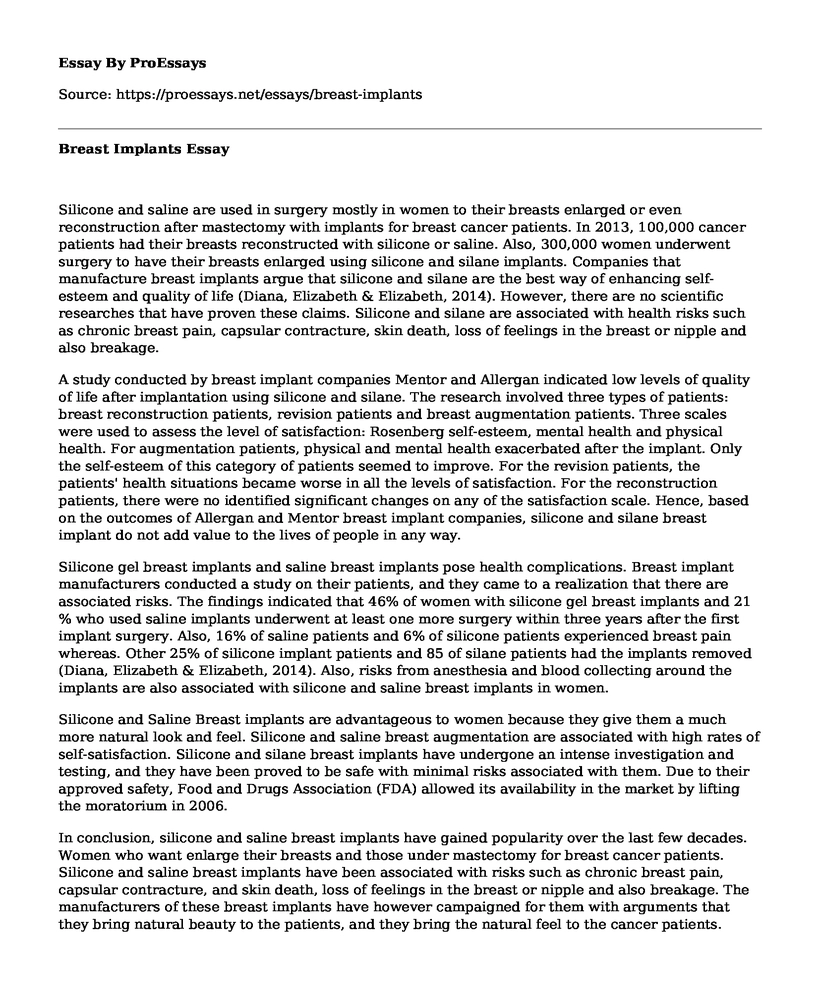Silicone and saline are used in surgery mostly in women to their breasts enlarged or even reconstruction after mastectomy with implants for breast cancer patients. In 2013, 100,000 cancer patients had their breasts reconstructed with silicone or saline. Also, 300,000 women underwent surgery to have their breasts enlarged using silicone and silane implants. Companies that manufacture breast implants argue that silicone and silane are the best way of enhancing self-esteem and quality of life (Diana, Elizabeth & Elizabeth, 2014). However, there are no scientific researches that have proven these claims. Silicone and silane are associated with health risks such as chronic breast pain, capsular contracture, skin death, loss of feelings in the breast or nipple and also breakage.
A study conducted by breast implant companies Mentor and Allergan indicated low levels of quality of life after implantation using silicone and silane. The research involved three types of patients: breast reconstruction patients, revision patients and breast augmentation patients. Three scales were used to assess the level of satisfaction: Rosenberg self-esteem, mental health and physical health. For augmentation patients, physical and mental health exacerbated after the implant. Only the self-esteem of this category of patients seemed to improve. For the revision patients, the patients' health situations became worse in all the levels of satisfaction. For the reconstruction patients, there were no identified significant changes on any of the satisfaction scale. Hence, based on the outcomes of Allergan and Mentor breast implant companies, silicone and silane breast implant do not add value to the lives of people in any way.
Silicone gel breast implants and saline breast implants pose health complications. Breast implant manufacturers conducted a study on their patients, and they came to a realization that there are associated risks. The findings indicated that 46% of women with silicone gel breast implants and 21 % who used saline implants underwent at least one more surgery within three years after the first implant surgery. Also, 16% of saline patients and 6% of silicone patients experienced breast pain whereas. Other 25% of silicone implant patients and 85 of silane patients had the implants removed (Diana, Elizabeth & Elizabeth, 2014). Also, risks from anesthesia and blood collecting around the implants are also associated with silicone and saline breast implants in women.
Silicone and Saline Breast implants are advantageous to women because they give them a much more natural look and feel. Silicone and saline breast augmentation are associated with high rates of self-satisfaction. Silicone and silane breast implants have undergone an intense investigation and testing, and they have been proved to be safe with minimal risks associated with them. Due to their approved safety, Food and Drugs Association (FDA) allowed its availability in the market by lifting the moratorium in 2006.
In conclusion, silicone and saline breast implants have gained popularity over the last few decades. Women who want enlarge their breasts and those under mastectomy for breast cancer patients. Silicone and saline breast implants have been associated with risks such as chronic breast pain, capsular contracture, and skin death, loss of feelings in the breast or nipple and also breakage. The manufacturers of these breast implants have however campaigned for them with arguments that they bring natural beauty to the patients, and they bring the natural feel to the cancer patients. Nevertheless, the risks outnumber the advantages of silicone and saline breast implants thus they are unsafe.
References
Diana .Z. Elizabeth .N. A. & Elizabeth.S. ( 2014, July 2). Facts About Breast Implants. Ourselves Bodies Information Inspires Actions. Retrieved July 8, 2015, from http://www.ourbodiesourselves.org/health-info/facts-about-breast-implants/
Cite this page
Breast Implants. (2021, Mar 05). Retrieved from https://proessays.net/essays/breast-implants
If you are the original author of this essay and no longer wish to have it published on the ProEssays website, please click below to request its removal:
- Nursing Scholarship Application Letter
- Clinical Practice Guidelines for the Management of Pain, Agitation, and Delirium (PAD) in Adult Patients
- Nursing Care Models Paper Example
- Enforcement of Surrogacy Contracts - Essay Sample
- My Career Choice: Nursing Paper Example
- Connor's Parents Dismissed for Failing to Exhaust Claims Under IDEA - Essay Sample
- Essay Sample on Sandra's Story: Living With Alzheimer's and Discrimination







